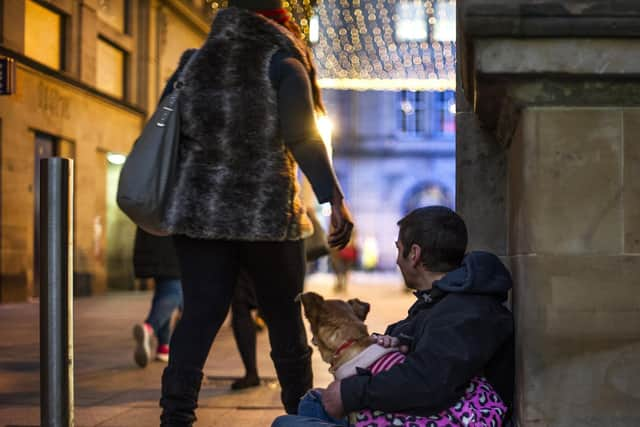Homelessness system in Scotland 'on the brink of failure'
There were 26,166 live homelessness cases in Scotland on March 31. This is the highest such a figure has ever been and 1,332 higher than the same date in 2021.
A total of 8,635 children are currently in temporary accommodation (up by 17 per cent on last year). This compares to 7,280 at March 31, 2020.
Advertisement
Hide AdAdvertisement
Hide AdThere has also been an increase in those becoming homeless from a private rented tenancy – 15 per cent compared with 11 per cent in 2020-21, almost reaching pre-pandemic proportions of 16 per cent (2019-20).


The Scottish Government said one contributory factor for the increase is “likely” to be the end of the ban on evictions imposed by emergency Covid legislation lifted on May 17, 2021.
To prevent more people becoming homeless during colder, winter months, Scottish Labour wants to see that winter ban implemented once again for 2022/23.
The call for the ban is part of Labour’s Emergency Cost of Living Act proposal which also includes a plan for legislation to impose a freeze on rents.
Mark Griffin, Scottish Labour Housing spokesperson told Scotland on Sunday: “When the pandemic hit we took the emergency action needed to prevent people being made homeless by a crisis they couldn’t control. People across Scotland are in the same position again, but the SNP government are refusing to act.


“This week damning new statistics showed homelessness is already on the rise, and without action, rising bills and falling temperatures will spell catastrophe this winter.”
With figures showing around 8 per cent of Scots, or 1 in 12 people, have experienced homelessness, the charity Crisis wants the government to implement measures to stop homelessness happening in the first place.
Alex Cole-Hamilton said he is backing calls for a winter eviction ban “for as long as the cost-of-living emergency goes unmitigated in a substantial way by either government”.
Advertisement
Hide AdAdvertisement
Hide AdIn a previous response to the Scottish Government rented sector consultation, Crisis did not support eviction bans over winter as it believed delaying evictions offers a solution “too late”.
However, the homelessness charity has now called for parts of the public sector outside of housing to take on a greater responsibility for helping people access support to stay in their homes.
The charity wants to see changes to homelessness prevention so people can get help up to 6 months before they are at risk of homelessness.
Its call comes as the charity predicts a “huge spike” in homelessness in Scotland over the coming months due to the cost of living crisis.
Matt Downie, chief executive of Crisis, said: “We strongly support new proposals to help prevent homelessness, but these changes will take time. That’s why we have released a new guide to homelessness prevention – to shine a light on the projects and organisations doing amazing work to help people stay in their homes, and to show how the new prevention measures can work in practice.”
Shelter Scotland said its clients in central Scotland who become homeless are being forced to move to the Highlands or the north of England as Scotland’s local authorities are running out of options to help. Local authorities told the charity they do not have the homes needed to support the “unprecedented number” of people in the system.
Shelter said the situation is “the worst it has ever seen” and that council homelessness services appear to be “on the brink of failure”.
The charity is calling on the First Minister to introduce a national initiative to ensure councils find the homes they need and guarantee every citizen their legal right to a home if they become homeless.
Advertisement
Hide AdAdvertisement
Hide AdAlison Watson, Director of Shelter Scotland, said the combined impact of rising evictions, Covid-19 related rent arrears, the cost-of-living crisis and the need to find accommodation to welcome Ukrainian refugees as issues which are “yet to show” in the numbers published today.
Ms Watson said: “These statistics show that with more people becoming homeless, more people stuck in the homelessness system for longer and more people likely to become homelessness as the cost of living crisis bites, Scotland’s homelessness system is now on the brink of failure.”
One in five people referred to food banks in the Trussell Trust's network in Scotland in late 2018 or early 2020 were homeless and the trust now worries this figure will increase as the cost of living crisis continues to worsen.
Polly Jones, head of Scotland at the trust, said the government should offer “immediate cash support” to families facing hardship and should seek long-term solutions to reducing hunger and poverty.
The Scottish Government said it has “put on permanent footing” improved protection against eviction brought in during the pandemic.
A spokesperson said: “The Scottish Government fully recognises the impact of the cost of living crisis on tenants and we are providing £83 million in direct financial support for housing this year.
“Our Tenant Grant Fund was set up to support people who faced rent arrears as a result of COVID-19, and we've put on a permanent footing the improved protection against eviction brought in during the pandemic. We are also introducing new prevention of homelessness duties so that individuals and families do not have to face the trauma and disruption to lives brought by homelessness.
“There are already strict legal processes a private sector landlord must follow to increase rent, including only being able to raise once a year and providing three months’ notice, and tenants can challenge any unfair rises. We are working to ensure more tenants know about these rights and how to use them.
Advertisement
Hide AdAdvertisement
Hide Ad“Through our New Deal for Tenants, we are committed to bringing in rent controls during this Parliament, and doing so in a way that will deliver a robust system giving long-lasting benefit to tenants.”
Comments
Want to join the conversation? Please or to comment on this article.